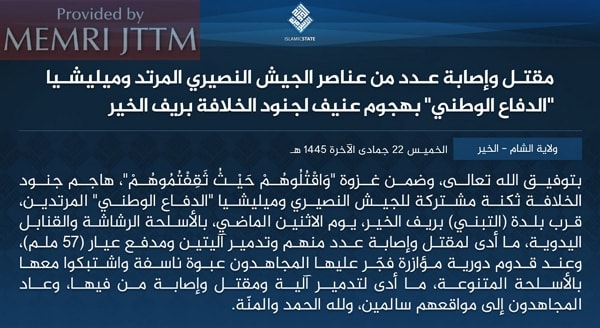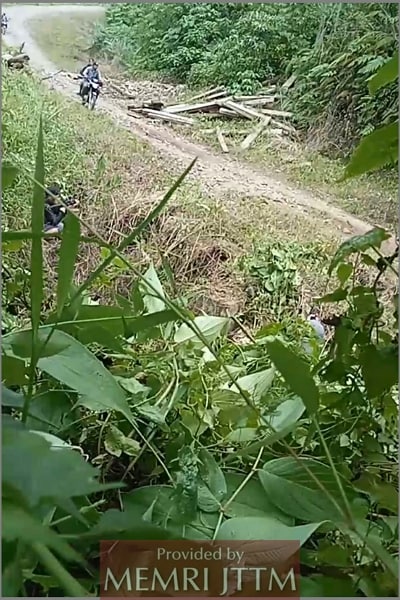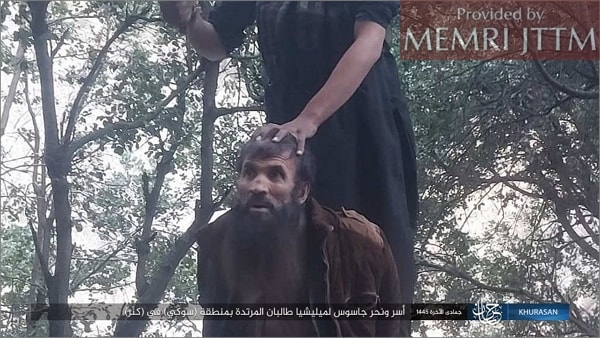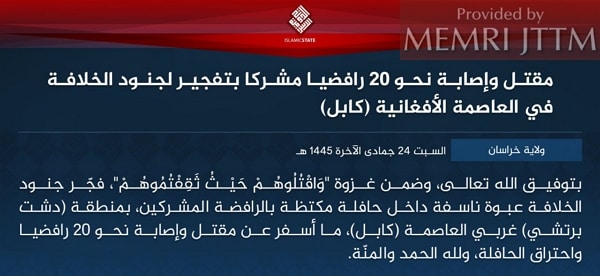The following report is now a complimentary offering from MEMRI's Jihad and Terrorism Threat Monitor (JTTM). For JTTM subscription information, click here.
On January 4, 2024, the Islamic State (ISIS) Al-Furqan media outlet released an audio message titled "And Kill Them Wherever You Find Them" (Quran 2:191), in which the organization's spokesman Abu Hudhayfah Al-Ansari declared support for the Muslims of Gaza, while discrediting Palestinian faction such as Hamas for their alliance with Iran and declaring that Palestine will only be truly liberated when it is governed in accordance with shari'a. The ISIS spokesman urged the organization's fighters and supporters to perpetrate attacks worldwide, including in the West.
Shortly thereafter, ISIS claimed responsibility for the January 3 twin bombing at a memorial for Qasem Soleimani, slain commander of Iran's Islamic Revolutionary Guard Corps (IRGC) Quds Force, near his grave in Kerman, Iran, alleging that it was perpetrated by two ISIS "martyrdom seekers" and that it killed and wounded more than 300 "polytheist Rafidites [a pejorative term for Shi'ites]." The ISIS claim noted that the attack was part of a campaign named "And Kill Them Wherever You Find Them."
This claim inaugurated a flood of others from multiple ISIS provinces, taking responsibility for dozens of attacks in several countries as part of the international ISIS campaign. Over the first four days of "And Kill Them Wherever You Find Them," ISIS claimed more than 60 attacks from eight provinces, as well as from Iran, which is not designated an ISIS province.
Following is a review of some of the significant attacks claimed as part of the campaign:
Syria
Between January 4 and 7, the Islamic State Syria Province claimed 23 attacks. It is noteworthy that a full 12 of them took place between January 1 and 3, before the campaign was announced, but were not claimed until January 4 or later. Prior to the campaign, the province had not claimed any attacks since December 23, 2023.
The majority of the attacks claimed in Syria as part of the campaign have been small-scale assaults targeting the Syrian Democratic Forces in the Deir Al-Zour and Al-Hasakah governorates in the east of the country. Some notable operations include a January 1 attack, using machine guns and hand grenades, on a barracks shared by the Syrian army and National Defense Forces militia near Al-Tibni, north of Deir Al-Zour, which killed and wounded several soldiers and destroyed two vehicles and a 57-mm cannon. The mujahideen also denotated an IED on reinforcement, destroying a vehicle and killing or wounding the soldiers onboard, before returning to their positions unharmed.

On January 5, ISIS operatives ambushed a Syrian army vehicle near Palmyra, in the desert east of Homs, and killed an officer by machine gun fire before burning the vehicle. On the same day, the mujahideen opened fire with machine guns on a Syrian army patrol on the road to Palmyra, killing two soldiers and capturing a 4x4 vehicle. Following both attacks, the mujahideen withdrew unharmed, according to ISIS.

ISWAP
The Islamic State West Africa Province (ISWAP) claimed 19 attacks during the first four days of the campaign, with 12 of them taking place before the campaign was announced. ISWAP claimed attacks in Nigeria, Cameroon, and Niger, targeting government forces and Christian civilians.
Some notable operations were a January 1 attack on the town of Bargaram, in northern Cameroon near the Nigerian border, in which four Christians were killed and eight captured, including the head of the local church. The mujahideen burned one motorbike and captured another, before returning to their positions unharmed. On January 6, ISWAP released a photoset showing scenes from the attack.

Also on January 1, ISWAP operatives attacked the town of Gatamarua, in Nigeria's Borno State, killing eight Christians and burning a vehicle and several homes, as well as seizing some possessions. A photoset published on January 6 documents the attack, showing several corpses, as well as a vehicle and houses on fire.
Another January 1 attack claimed as part of the campaign was a machine gun attack on Christians in a shop in Mararaba, in Nigeria's central state of Nasarawa, killing four and wounding others. This is the first attack claimed by ISWAP in Nasarawa State, the tenth Nigerian state in which the ISIS affiliate has claimed activity.

Iraq
The Islamic State Iraq Province claimed eight attacks during the first four days of the campaign, targeting government forces and the Popular Mobilization Units (PMU) and Tribal Mobilization Units (TMU). All but three of the attacks were perpetrated before the campaign was announced on January 4.
Among the more notable of these operations were January 1 attacks on two Federal Police stations in the Al-Waqf are of Diyala governorate, in which two infrared surveillance cameras were destroyed, and a January 2 IED attack on joint patrol of the Iraqi army and TMU in Wadi Al-Tharthar, Salah Al-Din governorate, destroying a 4x4 vehicle and killing a lieutenant colonel and a TMU commander.

ISCAP
The Islamic State Central Africa Province (ISCAP) claimed six attacks in the eastern Democratic Republic of the Congo (DRC), targeting Christian civilians and government forces.
Among the ISCAP attacks claimed as part of the ISIS campaign are a January 1 attack on a Congolese army position near Beni in North-Kivu province, killing one soldier. The mujahideen captured a rifle and burned the position after the remaining soldiers fled. ISCAP released a photoset documenting the attack on January 6.

On January 2, ISCAP fighters attacked another village in the Beni region, capturing and beheading three members of "local Christian militias" and burning three houses.
In a January 5 attack on the village of Mangina, in the same region, ISCAP fighters beheaded four Christians.

Mozambique
Since the launch of the ISIS campaign, the Islamic State Mozambique Province (ISMP) has claimed five attacks, all but one targeting Christian civilians and three of them perpetrated since January 4.
On January 2, mujahideen fired machine guns at two Mozambican army boats near an island in the Macomia district of Cabo Delgado province, wounding at least one soldier and damaging the boats.
In a January 3 attack on Ntotoe village in the province's Mocímboa da Praia district, ISMP fighters captured and killed three Christians and burned a church and dozens of houses, before returning to their positions unharmed. A photoset released on January 7 documented the attack.

On January 5, ISMP fighters attacked the village of Chimbanga, also in Mocímboa da Praia district, killing three Christians and burning 70 houses and three motorbikes. A photoset documenting the attack was released on January 6.

Sahel
The Islamic State Sahel Province claimed three attacks as part of the campaign, the first claimed by the province since December 8, 2023.
On January 2, the group's fighters attacked a checkpoint of the Malian army and Movement for the Salvation of Azawad (MSA) militia between Ménaka and Andéramboukane, in the country's east near the border with Niger, killing and wounding ten. The mujahideen also disabled one 4x4 vehicle and captured another, in addition to seizing various weapons and ammunition, before returning to their positions unharmed. On January 6, the Sahel Province released photos showing a group of several dozen heavily armed operatives swearing allegiance to ISIS leader Abu Hafs Al-Hashemi before the attack, then storming the position and capturing equipment.


On the same day, the group's fighters fired Grad rockets at a base of the Malian army and Wagner private military company (PMC) in Ménaka city.
In a January 5 attack on a checkpoint of pro-government militias in Kobé, Gao region, eight militiamen were killed, and others were wounded or fled. The mujahideen burned several motorbikes and captured five rifles, before returning to their positions unharmed. The Sahel Province released photos on January 7 showing corpses of slain militiamen, along with weapons and cash captured in the attack.

ISEAP
The Islamic State East Asia Province (ISEAP) claimed one attack as part of the campaign, its first since December 23, 2023.
On January 3, ISEAP fighters ambushed three "spies for the crusader Philippine army" in Lininding, Lanao del Norte province, killing them with machine guns and capturing two handguns. A 32-second video released on January 7 by ISIS' A'maq Agency documented the attack.

ISKP
Two attacks were claimed by the Islamic State Khorasan province (ISKP) as part of the campaign. Until now, the ISIS affiliate had not claimed any operations since November 22, 2023.
On January 2, ISKP operatives captured and beheaded an alleged spy for the Taliban in the Chawkay district of Afghanistan's Kunar province. Photos of the beheading were released on January 6.

On January 6, the group's fighters detonated an IED inside a bus "crowded with polytheistic Rafidites [a pejorative term for Shi'ites]" in the Dasht-e-Barchi neighborhood of western Kabul. According to the claim, the attack killed and wounded about 20 Shi'ites and caused the bus to catch fire.

The last global campaign of attacks launched by ISIS was the "Raid of Revenge for the Two Sheikhs" to avenge the deaths of ISIS leader Abu Ibrahim Al-Hashemi Al-Qurashi and spokesman Abu Hamzah Al-Qurashi, which included 245 attacks during 15 days in April-May 2022. Notably, ISIS did not launch a "raid of revenge" to avenge the killings of its third and fourth leaders, Abu Al-Hasan Al-Hashemi Al-Qurashi and Abu Al-Husayn Al-Husayni Al-Qurashi, whose deaths were announced in November 2022 and August 2023.
The full text of this post is available to subscribers.
Please login or register to request subscription information from MEMRI



